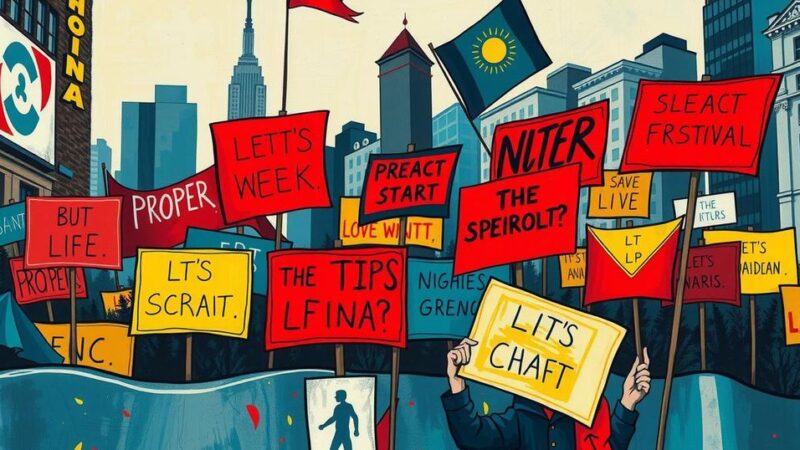Mozambicans are anticipated to vote on Wednesday, with the ruling Frelimo party likely to maintain its stronghold despite a challenge from independent candidate Venâncio Mondlane, who resonates with young voters. Frelimo has been in power since 1975 and faces allegations of electoral manipulation, which raises concerns about the integrity of the electoral process. Despite efforts to invigorate the opposition, analysts doubt that these shifts will result in a significant change in leadership.
Mozambicans are set to cast their votes on Wednesday in an election anticipated to be easily won by the ruling Frelimo party, despite a stirring presidential challenge from an independent candidate that is resonating with the youth. Frelimo has maintained its rule in Mozambique since 1975, following the end of Portuguese colonialism, and is introducing for the first time a candidate born post-independence, Daniel Chapo, who previously served as a provincial governor and was relatively obscure until his nomination in May as successor to outgoing President Filipe Nyusi. Frelimo’s primary opponent historically has been the Renamo party, the foe in a civil conflict from 1977 to 1992 that resulted in around one million fatalities. However, Venâncio Mondlane, a former Renamo member who departed to pursue an independent candidacy, is captivating younger voters. Analysts maintain that despite Mondlane’s popularity, Frelimo’s established authoritarian mechanisms will likely ensure its enduring dominance. The political landscape is fraught with difficulties for opposition contenders. Borges Nhamirre, a researcher at the Institute for Security Studies, stated, “The election is never difficult for an authoritarian regime. No matter what happens, the final result doesn’t depend on the voters’ will.” Mondlane’s charismatic late-night rallies have encouraged other candidates to harness social media and advocate for renegotiating contracts related to Mozambique’s natural gas and mining sectors. Analysts propose that without election integrity, Mondlane may not secure a victory. Mozambique ranks as the eighth poorest nation globally, with a GDP per capita of merely $608. Despite its wealth of natural resources, including extensive natural gas reserves, economic recovery has been hindered by an Islamic State-affiliated insurgency in Cabo Delgado province and revelations in 2016 regarding $2 billion in fraudulent loans linked to corruption, leading to significant withdrawal of international support. As the youth of Mozambique become increasingly educated and discontented with the current governmental state, the likelihood of another electoral outcome similar to the 2019 election—where Nyusi achieved 73% of the vote to Momade’s 22%—appears high. Anne Pitcher, a political science professor at the University of Michigan, remarked, “They’ve already done the rigging before the election. They’ve made it difficult for people to register to vote. In the areas where they are strong, they then make sure that they do a more comprehensive registration.” Concerns regarding the electoral roll’s integrity persist, with the Public Integrity Center revealing in June that approximately 879,000 fake voters were among the 17 million registered. Meanwhile, while Mondlane’s candidacy has invigorated numerous young Mozambicans, it has also polarized the opposition. Dércio Alfazema, an independent political analyst, indicated that “many voters will vote against Frelimo,” yet expressed skepticism that such votes would be sufficient to displace the ruling party from power.
The political dynamics in Mozambique have been shaped by decades of Frelimo’s governance post-independence. The nation has grappled with significant historical events, including a brutal civil war and considerable economic challenges, particularly following the exposure of corrupt financial dealings. The youth’s burgeoning dissatisfaction with the status quo amid ongoing economic hardships creates a complex backdrop as elections approach, heightening the stakes for political participation and representation in the country. The emergence of independent candidates like Venâncio Mondlane reflects a desire for change among younger voters, who constitute a significant portion of the population due to the median age of just 17 years.
In conclusion, while the Frelimo party is expected to retain its power in the upcoming elections, the rise of independent candidate Venâncio Mondlane signals a potential shift in voter sentiment, particularly among the youth. Despite the difficulties faced by opposition candidates and a history of electoral manipulation, the growing dissatisfaction among the populace may eventually exert pressure on the political establishment. Nevertheless, analysts continue to express doubts regarding the feasibility of overcoming entrenched authoritarian practices in this election cycle.
Original Source: www.theguardian.com






